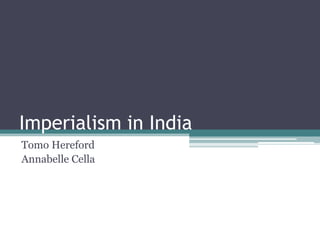
Imperialism in india
- 1. Imperialism in India Tomo Hereford Annabelle Cella
- 2. Overview Spices from India had become extremely valuable in Europe after the late 1400s. Portugal dominated waters and trade around India, assuming huge amounts of money. In 1599 a few British businessmen saw wealth in India and asked the Queen for an exclusive charter to trade with the region. In 1600, as a private company, the British East India Company set out to India on five ships.
- 3. Eventually the British East India Company would grow larger, adding more trading posts and soldiers. The company would hire Indians to fight to defend these trading posts from other European countries and Indians themselves. These Indians were called Sepoys. France and Portugal were the main threats to the East India Company because the held some ports along the coast. Also, they matched Britain technology, usually Indian native groups were not as dangerous to the company because they did not have the same firepower that the British did, unless they were being supplied by a European country.
- 4. By 1857 the British East India Company dominated India. They had taken most of the subcontinent and occupied nearly all of the coast line of the Bay of Bengal. In order to keep all of this land, the company was forced into debt by military spending. The company also lost its monopoly in 1854 and a Sepoy Rebellion followed. This was the beginning of the decline of the British East India Company. For the next 90 years, the British government would take direct control over these Indian territories, until India would receive its independence in 1947.
- 5. Although the East India Company was a private company, it functioned like an occupying government. For example, the East India Company had thousands of soldiers at their disposal, they manned forts, the company even set up courts and political offices. Indians were not allowed to work in any formal positions. The company was vital to the British economy as it nearly doubled economic production. Also, there was no initial problems with the East India Company for the British homeland. So the company was allowed gain more and more territory and take advantage of its monopoly in the area. After the decline of the East India Company, the British government itself was forced to take direct control of the territories, and apply a strict rule on native Indians.
- 6. Things to know. India was a hotspot for trade from the late 1400s until the mid 1800s. The British East India Company was possibly the largest, most powerful private corporation in history. The British East India Company was the biggest source for revenue for British economy. The company occupied nearly the entire Indian subcontinent during the height of its power in 1857. Its fall was due to its loss of monopoly in India, a rebellion, and the company ran itself broke from prices of war.
- 7. The British Take-over In 1858 the “Government of India Act” passed on the Indian territories from the British East India Company to the Royal Monarchy of Britain. From then until 1947 Britain would consider India its top colony.
- 8. Mahatma Gandhi Born on October 2, 1869 He studied in England even though he was excommunicated from his caste for leaving India. Upon his return he would emerge as an outstanding political figure who advocated change in India. He would be given the name, Mahatma meaning “Great Soul”. Lead the Indian Independence Movement and encouraged a protesting technique called Satyagraha, a peaceful civil disobedience. One example of this was, to protest the high salt taxes imposed by the British, Gandhi led thousands of people to make salt from the Ocean. This was known as the “Salt March”. Died January 30, 1948
- 9. Nehru Born 14 November 1889 As Gandhi’s younger counterpart, he was chosen by Gandhi to be his successor. On August 15, 1947 Nehru stepped up to be the 1st Prime Minister of Independent India. He supported the partition of two separate states of Pakistan and India, one for Hindus and one for Muslims. Nehru governed India until his death in May 27, 1964
- 10. Jinnah and The Muslim League Formed in 1906, the Muslim League played a major roll in the formation of Pakistan as a Muslim state. Jinnah served as a leader in the Muslim League from 1913 until India’s independence. Jinnah was an advocate of the Two-Nation Theory, which opposed Muslim-Hindi unity and proposed a separate nation for the two cultures.
- 11. Things to Know Gandhi was a major political figure during the Indian Independence movement. He founded a type of peaceful protest called Satyagraha. Nehru was the first Prime Minister of independent India, he was also an important member of the Indian National Congress and successor to Gandhi Jinnah was the founder of Pakistan. He was a major member of the Muslim league.